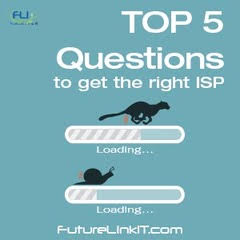 When choosing an Internet service provider, whether you’re just starting out or looking to upgrade, the options can be dizzying. Here are 5 questions to ask when determining whether your ISP is the right fit for your business.
When choosing an Internet service provider, whether you’re just starting out or looking to upgrade, the options can be dizzying. Here are 5 questions to ask when determining whether your ISP is the right fit for your business.
1) Is the ISP local?
The first factor to consider when looking for an internet provider is whether they serve your business location. Even some national provider’s services do not work well, or at all, in certain areas of the country.
We encourage you to look outside the box of big-name Internet service providers. Some smaller, local providers offer surprising levels of speed and bandwidth, at rates competitive or even less than national competitors—with more attentive and responsive customer service.
2) How secure and reliable is the ISP’s network?
Every business saves private or privileged information on computers or servers that must be protected. This should go without saying, but your business wireless internet connection should be encrypted, giving you security as well as control. You’ll be able to track and squash unwanted activity.
Do you have a redundant connection, so that in the case of service going down on one system, a backup connection is at the ready, so service remains uninterrupted?
3) What type of service do they offer (and does it match what you need)?
DSL (Digital Subscriber Link) uses phone lines to provide service. You’ll share bandwidth with others in your area. Uploads are typically slower than downloads. If your business requires the upload of a high volume of files or large files, you may find DSL impractical.
Cable internet uses cable TV infrastructure to transmit data. You’ll share available bandwidth with cable TV broadcasts as well as other area users. The more people using the connection at the same time, the slower performance will be—rarely reading the 50 to 100 Mb they promise.
Fiber optic is the fastest type of internet connection. If available in your area, it offers several advantages over DSL and cable – including dedicated bandwidth. (No sharing!) It can, however, be a costlier option.
4) How fast is your Internet speed?
If you use VOIP or video conferencing frequently, the right speed is required for seamless operation. Don’t forget – if you’re sharing bandwidth, actual speeds may not reflect what you’re paying for. In a nutshell, here are the speeds needed for common business activities according to NerdWallet:
- General web surfing, email, social media: 1 Mbps
- Video conferencing*: 1-4 Mbps
- Standard-definition video streaming: 3-4 Mbps
- High-definition video streaming: 5-8 Mbps
- Frequent large file downloading: 50 Mbps and up
*You’ll want at least a 1 Mbps upload speed for quality video conferencing.
5) What are the unique needs of your business?
There is no cookie-cutter “best solution” for every business. Your best bet is to yes, do your research, and then talk with an expert, who knows the right questions to ask about how your business operates, to determine the best fit. (Hint: if your ISP isn’t asking those questions… it may be time to get a new one.) Click here to schedule a chat with one of IT and Internet service experts today.

